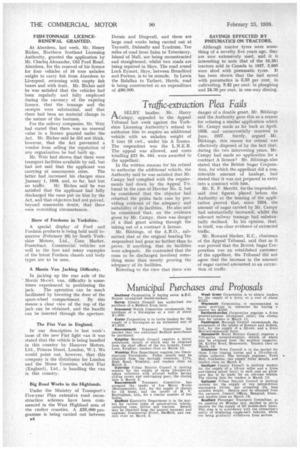Traffic-extraction Plea Fails
Page 38

If you've noticed an error in this article please click here to report it so we can fix it.
A SELBY haulier, Mr. Harry r‘Campy, appealed to the Appeal Tribunal last week against the Yorkshire Licensing Authority's refusal to authorize him to acquire an additional vehicle with an unladen weight of 2 tons 10 cwt, under his A licence. The respondent was the L.N.E.R. The appeal was allowed, and costs totalling £21 Os. 10d. were awarded to the appellant.
In the written reasons for his refusal to authorize the additional vehicle, the Authority said he was satisfied that Mr. Campy had complied with the requirements laid down by the Appeal Tribunal in the case of Hawker No. 2, but he considered that the objector had rebutted the prima facie case by pro-. viding evidence of the adequacy and suitability of its facilities. He also said he considered that, on the evidence given by Mr. Campy, there was danger of a dual grant arising through the taking out of a contract A licence.
Mr. Bibbings, of the A.R.O., submitted that at the original hearing the respondent had gone no-farther than to prove, if anything, that its facilities were adequate. He contended that the onus to be discharged involved something more than merely proving the adequacy of its facilities.
Referring to the view that there was danger of a double grant, Mr. Bibbings said the Authority gave this as a reason for refusing a similar application which Mr. Campy made ets far back as April, 1936, and unsuccessfully renewed in June, 1937. Surely, argued Mr. Bibbings, this reason for refusal was effectively disposed of by the fact that, during the two intervening years, Mr. Campy had made no application for a contract A licence? Mr. Bibbings also stated that the British Sugar Corporation, for which the appellant did a considerable amount of haulage, had stated that it was not prepared to enter into a contract with him.
Mr. E. P. Merritt, for the respondent, said that figures placed before the Authority at the hearing of the application proved that, since 1934, the amount of sugar carried by Mr. Campy had substantially increased, whilst the relevant railway tonnage had substantially declined. In his opinion, that, in itself, was clear evidence of extracted traffic,
Mr. Rowand Harker, KC., chairman of the Appeal Tribunal, said that as it was proved that the British Sugar Corporation was an established customer of the appellant, the Tribunal did not agree that the increase in the amount of sugar carried amounted to an extrac tion of traffic.
































































































